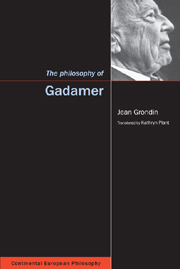Book contents
- Frontmatter
- Contents
- Abbreviations
- Translator's Note
- Introduction
- 1 The Problem of Method and the Project of a Hermeneutics of the Human Sciences
- 2 Truth after Art
- 3 The Destruction of Prejudices in Nineteenth-Century Aesthetics and Epistemology
- 4 Vigilance and Horizon in Hermeneutics
- 5 The Dialogue that We Are
- Conclusion
- Notes
- Bibliography
- Index
Introduction
- Frontmatter
- Contents
- Abbreviations
- Translator's Note
- Introduction
- 1 The Problem of Method and the Project of a Hermeneutics of the Human Sciences
- 2 Truth after Art
- 3 The Destruction of Prejudices in Nineteenth-Century Aesthetics and Epistemology
- 4 Vigilance and Horizon in Hermeneutics
- 5 The Dialogue that We Are
- Conclusion
- Notes
- Bibliography
- Index
Summary
1900
Hans-Georg Gadamer was born in Marburg, Germany on 11 February 1900. By chance, he was born, to the exact day, 250 years after Descartes's death. There are coincidences in the calendar! Indeed, it is difficult not to draw a further parallel with Descartes in the very title of Gadamer's major work, Truth and Method.
Descartes is the originator of the idea of method that forms the basis of the scientific project of modern times, or quite simply the modern method. For Descartes, the whole edifice of certain and indubitable knowledge, that of science, must be methodologically reviewed and made secure: knowledge founded on prejudice and tradition is from the beginning under suspicion, because its ultimate foundation does not enjoy absolute certainty: it is not resistant to all possible doubt. Descartes finds the foundation and model of this certainty in the evidence of the cogito, of the “I think” which is true each time I am aware of thinking, even when I take the trouble to doubt it, and even if an evil genius exerts himself in deceiving me when I am convinced of its certainty.
Modern knowledge is what wishes to eliminate the traditional because its ultimate foundation is not secure, and it promises to begin everything anew, starting with an unbreakable certainty – that of thought which is aware of its own thought. I cannot doubt that I am thinking when I think: I am, and at first I am only, a thinking thing.
- Type
- Chapter
- Information
- The Philosophy of Gadamer , pp. 1 - 16Publisher: Acumen PublishingPrint publication year: 2002



